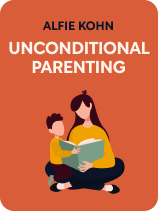

This article is an excerpt from the Shortform book guide to "Unconditional Parenting" by Alfie Kohn. Shortform has the world's best summaries and analyses of books you should be reading.
Like this article? Sign up for a free trial here .
What is Alfie Kohn’s Unconditional Parenting book about? What are the key takeaways you should know from Kohn’s book?
In Unconditional Parenting, Alfie Kohn aims to teach you what kids really need from their parents, why using rewards and punishments doesn’t work in the long term, and what you can do to make your kids feel loved and valued for who they are rather than what they do. While Unconditional Parenting has received mostly positive reviews, some critics have noted issues with Kohn’s advice.
Keep reading for an overview of Unconditional Parenting by Alfie Kohn, including the book’s key takeaways.
Alfie Kohn’s Unconditional Parenting: Overview
How can we raise kids to be self-confident, independent, and compassionate? In Unconditional Parenting, author and lecturer Alfie Kohn argues that we should throw away the standard parenting rulebook and replace it with a new approach built on unconditional support, acceptance, and understanding.
Unconditional Parenting, published in 2005, was an early contribution to the popular “gentle parenting” movement: a set of loosely associated approaches that move away from traditional discipline methods. Advocates for gentle parenting argue that it fosters autonomy, develops stronger parent-child bonds, and builds children’s internal motivation.
Alfie Kohn is the author of 14 books, most of which focus on education and parenting. In Unconditional Parenting, he argues that most of us have learned to parent in a “conditional” way: That is, we make our children believe that we only love them when they do what we want. In Part 1 of this guide, we’ll look at Alfie Kohn’s overall case for shifting from “conditional” to “unconditional” parenting. In Part 2, we’ll look at the core conditional parenting techniques (rewards and punishments) and why Kohn says we shouldn’t use them. And in Part 3, we’ll cover some key guidelines to keep in mind if you want to bring unconditional parenting into your home.
Some parents have criticized Kohn’s book for its lack of concrete behavior change strategies, so we’ll highlight his actionables and add a few more along the way. We’ll also update the research Kohn cites and consider other well-known approaches that align with his ideas, such as Montessori and Janet Lansbury’s RIE.
The Solution: Alfie Kohn’s Unconditional Parenting Style
To replace ineffective and damaging conditional parenting tactics, Alfie Kohn proposes “unconditional parenting.” This means making it absolutely clear to your child that your love doesn’t depend on their compliance.
Here’s the key takeaways from Alfie Kohn’s unconditional parenting style:
1. Prioritizes the relationship over the behavior. Kohn argues that people who use rewards and punishments treat the parent-child relationship as transactional. But while transactional relationships are common for adults, they’re not appropriate within families. Parental love and affection shouldn’t have to be earned.
2. Prioritizes long-term goals over short-term ones. Conditional parenting techniques might make a child comply right now, but they don’t help her to develop empathy, autonomy, and healthy self-esteem in the long run.
3. Prioritizes the child’s developmental needs over the adult’s convenience. Let’s be honest—parents often demand that a child do something because it makes the parent’s life easier, not because they have his best interests at heart. Unconditional parenting is putting the child first. To do this, you’ll need to be patient, flexible, and scrupulously honest about your motivations.
4. Sees the child as an active, rather than a passive, participant. Kohn recommends “working with” children rather than “doing to” them, which means seeing difficult behavior as a problem to be solved together, rather than as a trigger for criticism or punishment.

———End of Preview———
Like what you just read? Read the rest of the world's best book summary and analysis of Alfie Kohn's "Unconditional Parenting" at Shortform .
Here's what you'll find in our full Unconditional Parenting summary :
- How to raise kids to be self-confident, independent, and compassionate
- Why you should throw away the standard parenting rulebook
- Why rewards and punishments cause more harm than good






